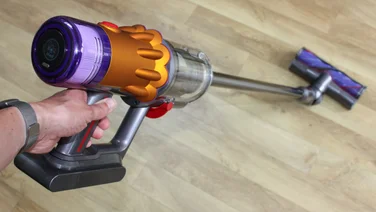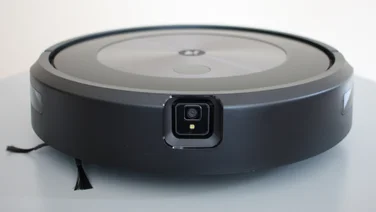To help us provide you with free impartial advice, we may earn a commission if you buy through links on our site. Learn more

A vacuum cleaner is a ubiquitous item in all households, but even the best vacuum cleaners can end up smelling less than fragrant. But don’t think you need to be stuck with those nasty niffs – these expert tips will have your vacuum cleaner smelling like roses again in no time.
Why do vacuum cleaners smell?
“A vacuum cleaner can emit unpleasant odours for several reasons,” explains Sophie Lane, Miele’s Product Training Manager. “One of the most common causes is a full or dirty dust bag or canister. When the bag or canister becomes too full, the accumulated dirt, dust, and debris can start to smell. Pet hair and food crumbs, in particular, can decay quickly and produce unpleasant odours.”
If you’ve got pets, it’s definitely worth investing in one of the best vacuum cleaners for pet hair so that you can easily pick up hair and dander that could be missed by a standard model. Pet hair can also accumulate within the brush, hose and filter, which allows dirt to get trapped, so using a suitable cleaner will go a long way towards helping.
Bacteria and mould can also be responsible for vacuum cleaner smells as Paul Hambridge, Managing Director of Factory Direct Flooring explains, “One of the main reasons a vacuum cleaner can quickly become smelly is the bacteria it sucks up from floors. In an experiment we commissioned, we identified six strains of bacteria types found on floors in our homes, and mould was the most common. And mould can be smelly. It’s especially rife on carpets in hallways and bedrooms, as well as in bathrooms. Vacuuming is the most effective cleaning method for reducing mould found on our floors; in fact, it cut mould germs by 71% on average. While it’s great for tackling mould on the floor’s surface, it can then collect in your vacuum cleaner’s filters, and even if you can’t see it, it can give off a musty odour.”
Finally, remember that if your vacuum cleaner is older it could start to smell due to parts wearing out or the motor overheating. It can sometimes be more economical in these cases to invest in a new machine, rather than trying to source replacement parts for your existing model.
Ways to make your vacuum cleaner smell better
Now you know why your vacuum cleaner is smelly, how do you make it smell better? Here are some tips to try:
1. Clean the filters
- Rinse – or replace – every few weeks
“To keep your vacuum cleaner smelling fresh, it’s important to regularly wash or replace the filters,” says Catrin Davies, Product Manager at Hoover. Olivia Young, Product Development Scientist at Astonish adds, “If the filter is washable, give it a good rinse every few weeks and let it air dry completely before popping it back in. A well-maintained vacuum not only performs better, but helps create a fresher, cleaner-smelling home overall.”
Keeping your filters clean also helps to prevent mould building up, as Paul Hambridge explains. “The best way to prevent mould building up in your vacuum cleaner is by emptying the container, and cleaning or replacing the filter after each use, depending on the type of vacuum you have. Reusable filters can usually be cleaned out by rinsing it in water, but make sure to check your specific appliance’s manual first. If you regularly empty the container and change the filter, and the smells are still lingering, try cleaning the bristles or even the inside of your vacuum’s hose.”
2. Don’t forget the dust canister and brush heads
- Empty after every cleaning session
- Remove hair from brush heads
“To eliminate unpleasant odours, it is important to empty the dust bag or canister regularly and wash it if possible,” says Sophie Lane. “The brush roll should be checked and cleared of any hair or debris.”
Dust canisters and brush rolls are both places that can easily trap dirt, debris and pet hair which, over time, will start to smell, allowing the vacuum cleaner to harbour odours. Empty out the canister after every hoovering session and make sure to remove hair from the brush rolls as a matter of course.
3. Use different brush heads for different jobs
- Using the wrong head can cause blockages
- Avoid transporting dirt around your house
Vacuum cleaners come with a range of heads to attach, designed to do certain jobs more efficiently. Using the heads for their intended use will also help to keep them cleaner, as you won’t clog them up by trying to tackle the wrong surface with a particular head. In addition, using separate heads for different jobs helps to prevent any cross-contamination and transferring dirt from different parts of the house.
4. Use a mild cleaning spray or white vinegar solution
Sometimes, just washing out parts of your vacuum cleaner isn’t enough. Olivia Young suggests a cleaning spray for brush heads and attachments. “Hair, fibres and bacteria can quickly accumulate here, so giving them a quick wipe with a gentle antibacterial spray helps maintain hygiene and reduce unwanted smells. Look for a formula that’s tough on germs but doesn’t overwhelm with harsh chemical scents – fruity or lightly fragranced antibacterial sprays can strike that balance beautifully.”
5. Use bicarbonate of soda
- Sprinkle onto your carpet before cleaning
Bicarbonate of soda, also known as baking soda, isn’t just for using in the kitchen. “For persistent smells, sprinkling baking soda on the floor and vacuuming it up can help absorb odours,” says Sophie Lane. Olivia Young agrees, “One of the simplest ways to instantly boost freshness is by sprinkling a small amount of bicarbonate of soda onto the carpet before vacuuming. It works as a natural deodoriser, absorbing trapped odours as you clean.”
6. Add essential oils
- A few drops on a cotton ball in your vacuum’s bin/bag
AO has teamed up with cleaning expert Bea Elton, who explains how scent can be used to help your vacuum cleaner smell better. “Adding scent to your cleaning routine can boost productivity and influence your mood, positively impacting your mental well-being. A simple trick is to add a few drops of essential oil to the water tank of your steam cleaner. As you clean your floors, the heat helps neutralise odours while filling your home with your favourite scent.”
“To make your vacuum smell better, add a drop of essential oil on a cotton ball in your vacuum bag. After you’ve added the oil, vacuum as normal. Essential oils produce a fragrance that travels outside of the vacuum’s vents, making anywhere your vacuum smell great adding fragrance to the air as you clean.”
Olivia Young also suggests particular scents, “For those who like a more fragrant finish, adding a couple of drops of essential oil – think lemon, lavender or even peppermint – to a cotton pad and placing it in the dust compartment can gently infuse your space with a subtle, clean scent as you vacuum.”






